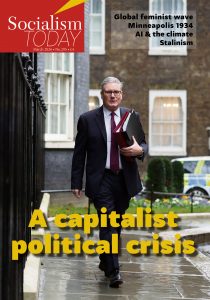
Yet again, Britain has a ‘dead prime minister walking’. Keir Starmer has survived his worst crisis yet, for now, but he is living on borrowed time. The next convulsion at the top of the Labour Party is possible at any point, perhaps triggered as soon as the result of the Gorton and Denton by-election. The capitalist media is full of discussion about Starmer’s weaknesses, the personal ambitions of the different contenders to replace him, and the undoubted scheming and manoeuvring for position on all sides.
None of this surface commentary, however, explains the root cause of the current crisis. Starmer is Britain’s fourth prime minister in four years. In the post-second world war period, prior to the 2007-08 financial crash, there was only one prime minister who was forced out of office in three years or less, the Tory Anthony Eden who resigned after the 1956 Suez Crisis. Since the financial crash and subsequent Great Recession, no prime minster governing on behalf of a single party has survived into a fourth year. Tony Blair, who stepped down as prime minister in June 2007, was the last to do so.
Read more